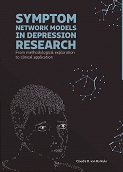 Psychological Methods
Psychological Methods
Psychology/Psychiatry
University of Amsterdam / Medical University Center Groningen
Supervisors
Robert A. Schoevers (UMCG), Denny Borsboom (UvA)
On January 17th, 2018, Claudia van Borkulo will defend her thesis entitled
 Summary
Summary
According to the network perspective on psychopathology, mental disorders can be viewed as a network of causally interacting symptoms. With the network approach in mind, hypotheses can be formulated about psychopathology and treatment.
The starting point of Claudia van Borkulo’s thesis is based on two central questions: “Why do some people develop a depressive episode, while others do not?” and “Why do some patients recover, while others do not?” She investigated these questions from a network perspective. To be able to do that, she first developed the required methodology: eLasso (implemented in R-package IsingFit) to infer the network structure from binary data and the Network Comparison Test (NCT; implemented in R-package NetworkComparisonTest) to statistically compare networks. In several validation studies, she showed that eLasso is a computational efficient method that performs well under various circumstances in psychology and psychiatry research. Also, NCT can detect differences under various circumstances.
Subsequently, she applied the methods to empirical data. She showed that the density of patients’ symptom network was associated with the course of depression. Also, centrality of the depression symptoms of healthy individuals seems to have a predictive value for developing depression. Although these results pertain to group-level networks – thereby making it unclear what the results mean to an individual – they provide interesting starting points for future research.
Project
A network approach to mood disorders
In recent years, network approaches to psychopathology have been rising in popularity. In these approaches, symptoms are modeled as components in a complex system, which (mutually) reinforce each other. The goals of the current project are (1) to extend and refine network modeling approaches so that they become more suitable for the analysis of data in clinical psychology, (2) to apply the resulting models to relevant datasets (cross-sectional and longitudinal) to uncover the architecture of disorders like major depression, and (3) to use this information to construct simulation models that can be used to model the development of disorders and the effect of interventions.
Financed by
UMCG (and UvA)
